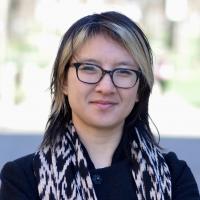Two projects led by iSchool faculty members have been selected as Humanities Research Institute (HRI) Research Clusters for 2020-2021. Formerly known as the Illinois Program for Research in the Humanities, HRI fosters interdisciplinary study in the humanities, arts, and social sciences at the University of Illinois. HRI Research Clusters enable faculty and graduate students to “develop questions or subjects of inquiry that require or would be enhanced by collaborative work.” Projects selected as clusters receive grants of $2,500 to support their activities.
Associate Professor Anita Say Chan; Assistant Professor Rachel M. Magee; Karen Rodriguez'G, director of the Office of Undergraduate Research; Gilberto Rosas, associate professor of Anthropology and Latina/o studies; and Adrian Wong, PhD student in the Institute of Communications Research, were awarded a Research Cluster for their project, "Community Research Cooperative: Methodologies for Research Justice." According to the researchers, “community and civic groups have traditionally been overlooked as key data stakeholders, research practitioners, or experts as the concerns of the IT industry have come to dominate framings around 'data,' and as data research norms increasingly pivot around corporate-scaled 'big data' needs." This cluster aims to address the critical need to design and implement accountable models for community-centered, socially engaged research practice.
Affiliate Professor Lisa Janicke Hinchliffe, professor and coordinator for information literacy services and instruction in the University Library, and Associate Professor Yang Wang will lead the cluster, "AI & Society." Participants in the cluster include Assistant Professor Yun Huang, Teaching Associate Professor and Acting BS/IS Program Director Judith Pintar, Assistant Professor Jodi Schneider, and Informatics PhD student John Bambenek. The researchers are interested in ethical and socially intentional uses of artificial intelligence (AI), "which anticipate and attempt to mitigate negative social consequences, which design for diverse users, and which work towards positive cultural, and social change." They will explore humanistic approaches to AI by identifying key issues that relate to their personal research and teaching; sharing their work with graduate students, faculty, and others on campus and in the community; and discussing the work being done by other scholars from other disciplines.






